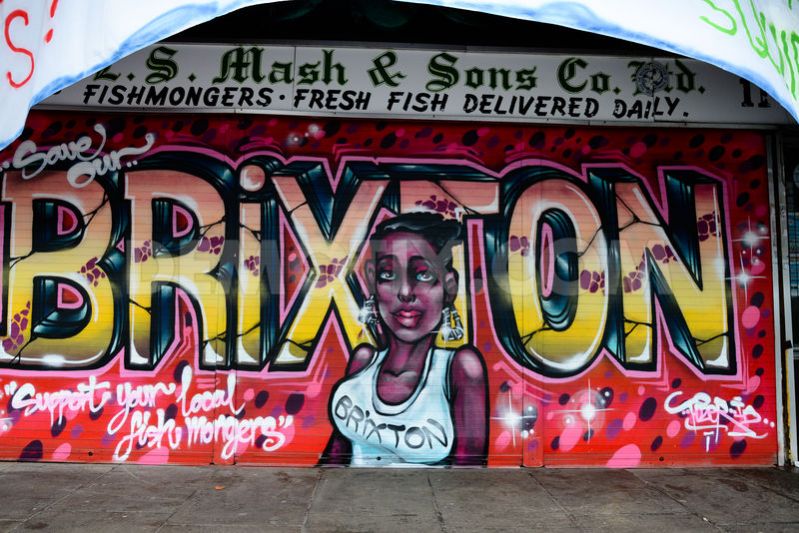You have no items in your cart. Want to get some nice things?
Go shopping
Recently, a friend and I had lunch at the Ritzy cinema bar in central Brixton. As I placed my order, I remembered that the business where I was standing was the place where staff campaigned and went out on strike for a living wage.
My seat offered me a view of Windrush Square and the Town Hall building across the road. Once I finished my meal, I went down the stairs and through the ground floor dining area where customers were enjoying their Sunday dinners and fine wines. What struck me as my colleague and I made our way to the exit was that among the diners, there wasn’t a single face of colour to be found. Brixton has changed irreversibly.
My mind rewound back to the late 1970s and early 1980s: top ranking sound systems carrying wardrobe-size speaker boxes into Brixton Town Hall on a Friday evening. Later on the same night, just around the corner from the reggae clash, kung fu fans practised their flying kicks outside the Ace cinema following the viewing of a Bruce Lee double bill. On a Saturday morning the many reggae record ‘shacks’ would be selling vinyl straight outta Kingston, Jamaica. If you had the need to score weed, you would make your way past ramshackle terraced housing where the windows were covered by jagged corrugated sheets of metal. You would nod your greetings to the squatters who resided in those crumbling properties on your way to the ‘Front Line’ – Railton Road. If anyone suggested that in the future, a Sushi bar and an art gallery would open on the street, you’d be branded crazier than the end-of-the-world ranters who would sometimes appear outside the tube station. For those who were in the unfortunate predicament of trying to sell a terraced property in central Brixton, they hardly received more payment for their home than the trade of a Ford Cortina mark 4.
More than thirty years later, anybody earning less than £30,000 a year might as well forget about applying for a mortgage in central Brixton. Properties in and around Railton Road are on the market for up to £600,000 and rising. The local council, desperate to attract any kind of income in the never-ending onslaught of deep government cuts, are leasing sites to property developers who build apartment blocks that are only affordable to the middle class. Those who were born, schooled and earned their first pay cheque in the area cannot afford a slate over their head in the same post code. Many young people on the council housing list are being offered accommodation as far afield as Milton Keynes and Folkestone – if they accept the offer it’ll prise them away from the support network of family and friends that young people desperately need to build a secure family life. In this pursuit of greed even schools have been bulldozed to make way for gated communities. Austerity is a word that landlords cannot even spell as they hike up rents whenever they contemplate building a villa in Barbados. To sum up, the working class are being cleansed from central London before our very eyes.
I for one, refuse to blame the affluent new arrivals in Brixton – they see this corner of south west London as an attractive place to live, close to central London with good public transport networks and a thriving Brixton Village where they can relax in a high quality restaurant following a hard day’s shopping and browsing in the market. In my opinion the culpability should bruise the feet of politicians of all shades. Since Margaret Thatcher gave the right to council house dwellers to buy their own property, our dear leaders have utterly failed to build or provide more council housing stock. Even in the boom days of Tony Blair’s three election wins, no-one seemed to say, ‘wait a minute, where are the young working class in our inner cities going to live?’
To arrest this housing injustice I would immediately introduce a rent cap (this is nothing new, it actually works in many big cities in Europe) and force the property developers, who have those big juicy construction contracts granted to them by local councils, to build a much bigger percentage of new homes that are affordable for the working class. Once you take gluttony out of the housing crisis equation, it’s not rocket science to try and seek a solution.
I’m always asked if I think they’ll be another ‘uprising’ in Brixton similar to what occurred in 1981. People might well take to the streets over the housing crisis but I don’t think the agitators, rebels and anarchists will have a Brixton address.

About Alex Wheatle
Alex Wheatle was born in 1963 to Jamaican parents living in Brixton but spent most of his childhood in a Surrey children’s home. He returned to Brixton in 1977 where he founded the Crucial Rocker sound system and performed his own songs and lyrics under the name of Yardman Irie. He spent a short stint in prison following the Brixton uprising of 1981. Following his release from prison he continued to write poems and lyrics and became known as the Brixtonbard.





Austerity is a word that landlords cannot even spell as they hike up rents whenever they contemplate building a villa in Barbados. To sum up, the working class are being cleansed from central London before our very eyes.